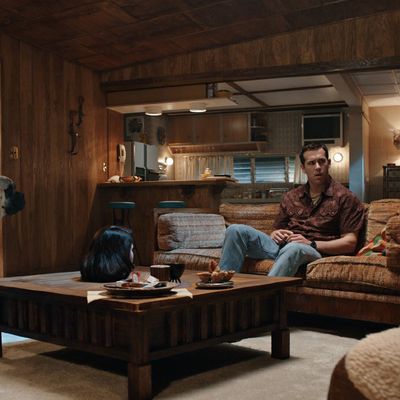
A quirk-filled serial-killer comedy that feels like something Sundance might have rejected as too trite 15 years ago (alas, it premiered there last year), The Voices has one bizarrely unexpected thing going for it: Its the most likable Ryan Reynolds has been in a film in, well, forever, basically. Hes not necessarily good, mind you. As Jerry, a psychologically troubled young ex-con who works in a bathtub factory and hears his pets talking to him, Reynolds struggles to breathe life into a character whose main character trait is his lack of cohesion. But theres something in there, finally, beneath that typically placid, passionless face of his  a curious, all-American dorkiness. You start to feel for the guy  not just as a man battling his psychic demons, but also as an actor trying to find something to latch onto amid the tonal mishmash of this film.
The Voices presents itself largely through JerryÔÇÖs perspective. He lives in a candy-colored world where he, for all his awkwardness, seems to be the only normal one; everyone else is too snotty or judgmental or weird. Save for his shrink, played by Jacki Weaver, who seems to be vigilant and caring. Then there are the girls ÔÇö whether itÔÇÖs Fiona (Gemma Arterton), the curvy new British girl in accounting, or Lisa (Anna Kendrick), the cute shrinking violet. At nights Jerry comes home to Bosco, a mopey dog who doles out pleasantries and platitudes, and Mr. Whiskers, a cat with a Scottish burr who offers nothing but doubt and exhortations to violence. ÔÇ£SheÔÇÖs from England, Jerry,ÔÇØ Mr. Whiskers says about Fiona. ÔÇ£In her eyes, youÔÇÖre a ridiculous peasant!ÔÇØ JerryÔÇÖs pets may be the angel and devil on his shoulders, but the cat usually wins: As Jerry puts it later, ÔÇ£I try to be good, but certain terrible things happen.ÔÇØ
The textures of his world seem to change with the medication he takes, and we soon understand that what weÔÇÖre watching is the creation of a deeply unstable mind. The Voices is a grisly movie, but itÔÇÖs not a particularly graphic one ÔÇö not unlike Norman Bates, Jerry seems horrified by violence, and the film has absorbed his revulsion. Director Marjane Satrapi (who made at least one very good film in 2007ÔÇÖs Persepolis, adapted from her own comic book about growing up in Iran) presents JerryÔÇÖs world with occasional reminders of the darkness that lurks beyond the walls of his mind. But it all comes off feeling like warmed-over David Lynch, with a little American Psycho thrown in.
The horrors eventually start to become more than Jerry can manage. As his life starts to go increasingly haywire, The Voices threatens to slide into slasher-movie drivel. It pulls back, but the hesitation feels less like playful subversion and more like a poverty of imagination. This film really doesnÔÇÖt know what to do with itself, except to show us the difference between JerryÔÇÖs happy world and his dark world as if itÔÇÖs some kind of revelation; itÔÇÖs the one move the film has, and it does it over and over again. For his part, Reynolds has to do a lot (he does the petsÔÇÖ voices, too), but none of it coalesces. Instead of each new aspect of his character fleshing out the rest, in his case, it feels like flatness added upon flatness. ThatÔÇÖs probably the point: When the self is fractured to this degree, The Voices tells us, none of the pieces fit together. That may make for a compelling diagnosis, but as cinema, itÔÇÖs pretty much unwatchable.


